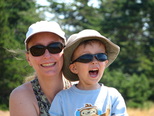Why Whistler, Why now? How it all began:

The idea of holding a half marathon road running event was born about 2006 not long after race director, Dave Clark, had run numerous half marathons and his first (and only) ultra marathon. It was clear at that time that these wonderful running races were being held in communities across the globe - so why not in Whistler?
Inspiration to spend the time and effort developing the event's business plan from concept to completion came from the fact that Dave's wife, Wendy, suffers from Crohn's disease. "I have seen the pain and anguish that Crohn's disease can cause and I am determined to do all that I can to support research for a cure". Wendy was diagnosed a few years before the couple met and moved to Whistler; and as with most sufferers she tried numerous approaches to managing the disease so that she could pursue a healthy and active lifestyle. Thankfully Wendy has found the balance of diet and medications that allow for her to live the life she wants, sharing it with her son, husband and family.
The Whistler Half Marathon truly is a dedication to the love and support for one's life long companion and partner.
Inspiration to spend the time and effort developing the event's business plan from concept to completion came from the fact that Dave's wife, Wendy, suffers from Crohn's disease. "I have seen the pain and anguish that Crohn's disease can cause and I am determined to do all that I can to support research for a cure". Wendy was diagnosed a few years before the couple met and moved to Whistler; and as with most sufferers she tried numerous approaches to managing the disease so that she could pursue a healthy and active lifestyle. Thankfully Wendy has found the balance of diet and medications that allow for her to live the life she wants, sharing it with her son, husband and family.
The Whistler Half Marathon truly is a dedication to the love and support for one's life long companion and partner.
The real poop on why we support CCC

More information on CCFC
Let's face it, stool (or feces) is about as natural as you can get - as is the bodily function of the human bowel and GI tract. But when natural things don't work as they should, something that many people consider to be a normal every day occurrence becomes the centre of our life. There are very few things that we human can honestly live without, and bowel function is one of them.
Over 250,000 Canadians live with IBD (Crohn's Disease and Ulcerative Colitis) yet so many people have never heard about it. Why is this? Well, a disease like this rarely becomes dinner time conversation in a household without a sufferer. Much like breast cancer was not talked about 25-30 years ago - diseases that effect what are generally considered to be more private parts of our body are sometimes uncomfortable to talk about. We hope to change that. Let's make IBD a dinner time conversation, because with greater awareness comes more access to research grants, which can lead to cures for these horrible diseases in our life time.
That is the poop on why we support CCC.
Over 250,000 Canadians live with IBD (Crohn's Disease and Ulcerative Colitis) yet so many people have never heard about it. Why is this? Well, a disease like this rarely becomes dinner time conversation in a household without a sufferer. Much like breast cancer was not talked about 25-30 years ago - diseases that effect what are generally considered to be more private parts of our body are sometimes uncomfortable to talk about. We hope to change that. Let's make IBD a dinner time conversation, because with greater awareness comes more access to research grants, which can lead to cures for these horrible diseases in our life time.
That is the poop on why we support CCC.

